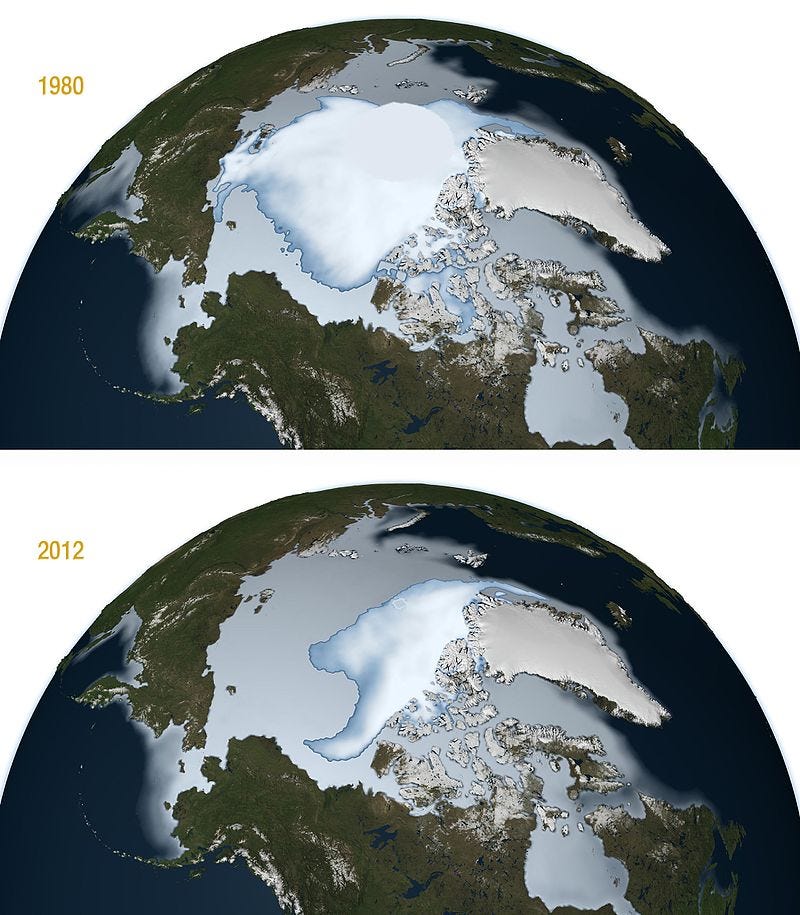
In today’s newsletter:
-Two Book Contests (Short)
-What Was In The Paid Newsletter Last Week (Short)
-How The Left Can Lose The Political Battle Over Climate Change (Longish Column)
Two Book Contests
Q&A Contest: Why We Dream: The Transformative Power of Our Nightly Journey by Alice Robb. Disclosure: I am friends with the author. But this is a genuinely excellent book and I can’t recommend it enough. I was hit with a wave of writerly jealousy when I read a galley last fall — Why We Dream just packs so much research and intellectual history into such a readable book, and plus it has some tips for those who might want to dabble in lucid dreaming (I’m too scared). Next week I’m going to feature a Q&A with Alice, and I’d like it to be centered on your questions for her. If you have one, send an email to singalminded@gmail.com with ‘dream’ in the subject line. (This isn’t a random giveaway, so don’t send an email there if you don’t have a question, please.)
Random Giveaway Contest: That Good Night: Life and Medicine in the Eleventh Hour by Sunita Puri. This one I haven’t read but it looks fascinating and very of-the-moment given demographic and healthcare trends in the U.S.:
[A] powerful new memoir from Dr. Sunita Puri. Dr. Puri is a palliative care physician who specializes in guiding and caring for patients who are suffering from critical illness. Her field is an increasingly relevant one and her first book is a moving look at the two opposing pulls of her life: the influence of her parents, Indian immigrants and practicing Hindus who taught her that life is temporary, and Western medicine, which stresses survival above everything else – sometimes even above the comfort and dignity of the patient.
I’ve got two copies for free or paid subscribers who are based in the United States. Send an email to singalminded@gmail.com with ‘goodnight’ in the subject line. The deadline for both giveaways is 9 a.m. Eastern, tomorrow (4/9/219).
What Was In The Paid Newsletter Last Week
On Wednesday, I published a long post explaining why so many progressives — including those writing for major outlets and institutions like The Nation, Slate, and the ACLU — are making highly questionable arguments about biological sex, including that it isn’t ‘real’ or is too complicated for the male/female distinction, as it is traditionally understood, to be useful. Friday I published some genuinely excellent emails from readers, as well as two extended back-and-forths (backs-and-forth?) between myself and my correspondents. Topics there included gender identity, the biological-sex stuff, Slate and Pete Buttigieg and left-wing identitarianism, and Native American polling on the Washington football team’s name. Also on Friday I posted my first-ever Singal-Minded Ask Me Anything, which elicited some great questions about the finances of being a journalist, my interest in video games and ‘books’ (basically video games, but delivered in a more linear, usually paperbound form), and whether my skepticism of the implicit association test extends to the very concept of implicit bias itself.
If you want access to all this good stuff, have I got some buttons for you!
How The Left Can Lose The Political Battle Over Climate Change
If you’re going to express any qualms or critiques about how left-of-center figures frame the debate on climate change, which I’m about to do, it’s important to first acknowledge that the biggest reason there even is a debate is because of a right-wing belief system: climate denialism. Those who take the view that anthropogenic warming isn’t real, or that its threat is overhyped, are overwhelmingly on the political right, after all. Right-wing political and media figures, as well as a number of major corporations and institutions, have spread these memes either because they benefit directly from polluting industries and don’t want those industries taxed or regulated, because they benefit from the financial or political support of those industries, or because they see the issue as red meat for a conservative American base suspicious of liberals, mainstream scientific bodies, and ‘elites’ in general. Sometimes it’s a mix of all three.
A million pages have been written on this. It’s a disaster. There’s no present-day belief system that flies in the face of so much evidence and which has the potential to do so much harm. If you were handed a button and someone told you “When you press this button, you can change one thing, and one thing only, about the present politics of climate change to improve the chance the world will avoid or at least significantly ameliorate the looming catastrophe,” the choice would be obvious: You would end climate denialism. This, of course, would not end the debate over how to address climate change. But from an American perspective, it would at least put us in the same room as the rest of the developed world.
Unfortunately, the hand we were dealt includes climate denialism as a big, malicious force that has forestalled meaningful American action on this front. Our president is a climate denier and his Republican Party has embraced this ideology.
All of which is good reason to think carefully about how to frame left-of-center arguments about climate change. I can sense the eyes rolling already — What’s the point of debating how we debate this when the other side is so damn stubborn? But there are many issues on which there have been dramatic changes to American public opinion, with important social consequences. The most obvious example is gay marriage:
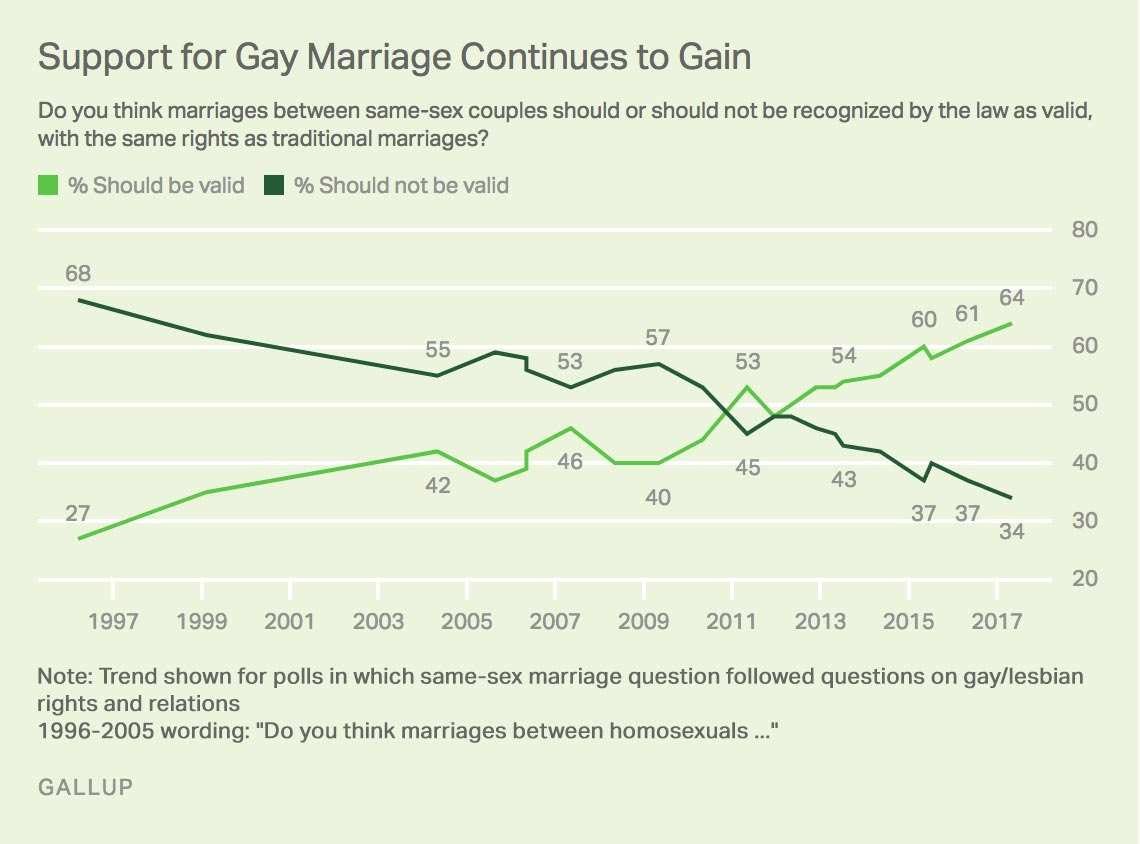
Some issues, on the other hand, become so intensely politicized that they basically don’t budge anymore. Abortion is the clearest example of such an issue — whatever your stance on it, you can’t be happy with your side’s ‘progress’ in the last couple decades:
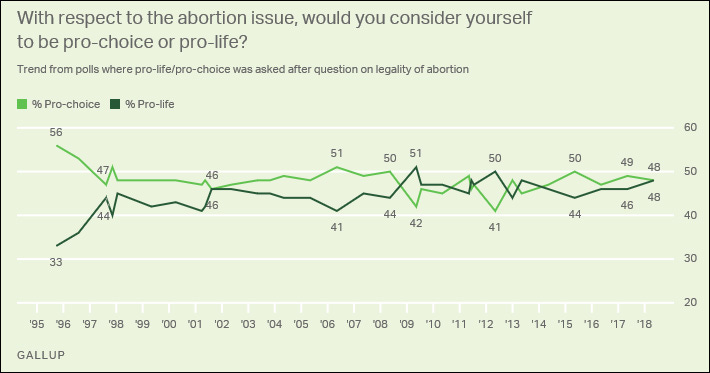
With climate change, the politics are a bit complicated. Overall rates of all-out denialism are low:
But the denialism that’s there is centered on the right flank of the Republican party:
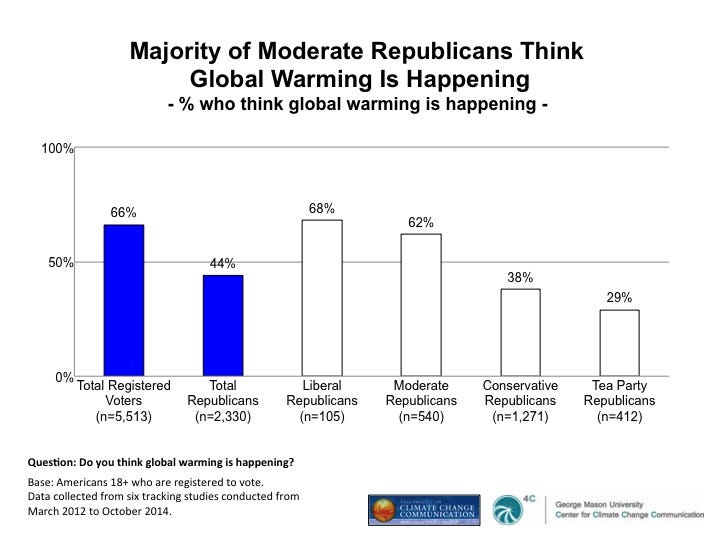
In light of all this, I understand the argument that there’s no real point in worrying about the specifics of framing — these are hardline conservatives who have probably made up their minds for good. Plus, various aspects of the American political system give an outsized voice to conservative Republican voters. They have disproportionate power, unfortunately, and they’re deeply committed to climate-change denialism, so why bother? We’ll have to go around them.
But I’m not sure that this fatalistic stance fully takes the nature of climate denialism into account. That’s why I get a bit worried when I see the climate-change fight presented not as a struggle involving everyone, but as a clearly defined battle of hard-left versus hard-right ideology. These are just a couple of the clearest examples I’ve come across of a message you’ll see just about everywhere, these days (the tweet is from a staff writer at Grist, a respected environmental publication, who has a huge Twitter following):
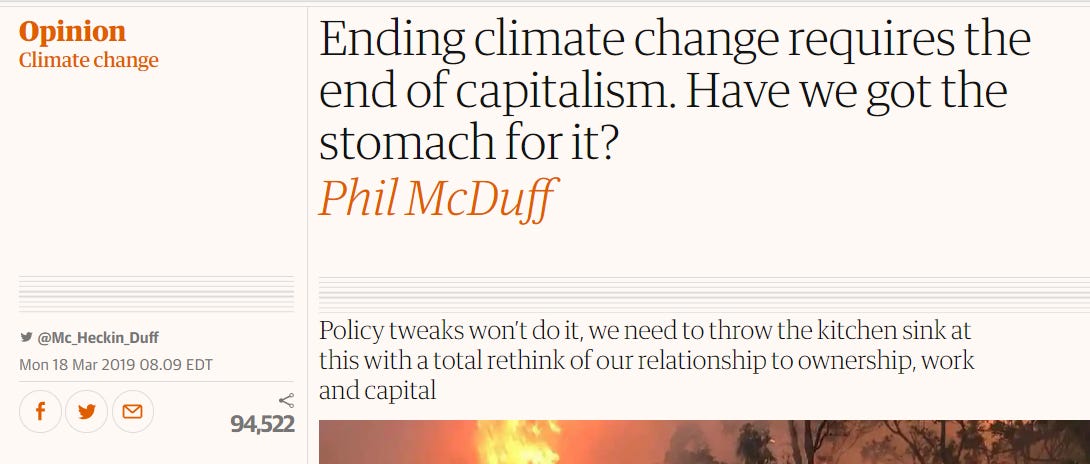
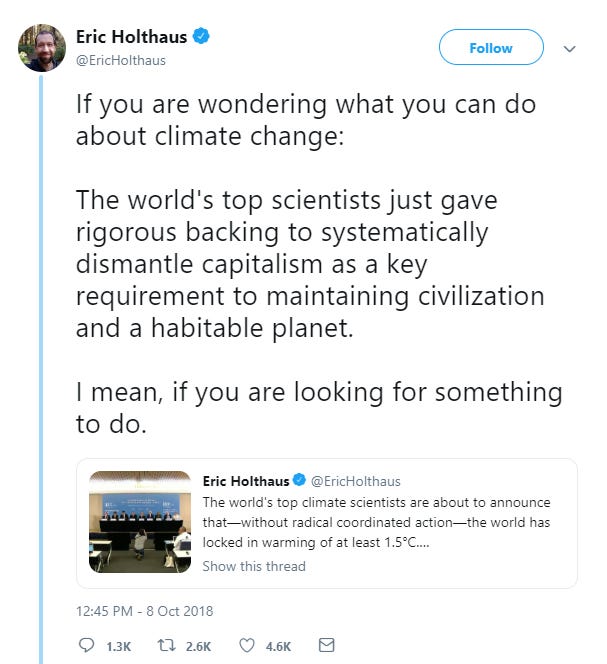
I guess if you really believe that the only way to address climate change is to dismantle capitalism, I’m not going to convince you otherwise. I hope you’ll at least read Matt Breunig’s brief explanation of why he thinks this is silly (Breunig is no one’s idea of a capitalism-fan):
Sometimes people will say that climate change is because of capitalism, but the connection seems quite tenuous to me.
Most of the carbon emissions have happened under capitalism, but there is little reason to believe the emissions would not have also occurred under socialist governance. The case of the USSR is instructive because the USSR economy grew rapidly during the middle of the 20th century and also produced a lot of carbon-based energy. Indeed, fossil fuel energy was the USSR’s primary export product, just like Venezuela and Norway.
The arguments about capitalism seem to gloss over the fact that producing and consuming a lot of energy is key to increasing output and therefore key to improving people’s material conditions. Capitalists burned a lot of fossil fuel because more output meant more room to profit and socialists (would have) burned a lot of fossil fuel because they generally favor higher standards of living for the working class.
The real conflict at the heart of climate change is between generations. Getting current generations to sacrifice some of their standard of living in order to help future generations out is a tough political problem, but not one exclusive to a particular economic system.
If there are reasons to suspect that the dismantling of capitalism isn’t a necessary condition for addressing climate change, there are very, very good reasons to avoid this sort of framing.
The best researcher on this subject is Dan Kahan, a professor of law and psychology at Yale University. “He is a member of the Cultural Cognition Project, an interdisciplinary team of scholars who use empirical methods to examine the impact of group values on perceptions of risk and related facts,” his webpage notes. “In studies funded by the National Science Foundation, his research has investigated public disagreement over climate change, public reactions to emerging technologies, and conflicting public impressions of scientific consensus.”
Kahan has found, over and over and over, that believing or not believing in climate change has much more to do with one’s political identity than with one’s level of scientific knowledge. In fact, he has published and pointed to research suggesting the correlation between knowledge of the scientific processes underpinning climate change and belief in climate change is nil.
He explains this better than I ever could:
I’m going to tell you what I regard as the single most consequential insight you can learn from empirical research in these fields if your goal is to promote constructive public engagement with climate science in American society.
It's this:
What people “believe” about global warming doesn’t reflect what they know; it expresses who they are.
Accordingly, if you want to promote constructive public engagement with the best available evidence, you have to change the meaning of the climate change.
You have to disentangle positions on it from opposing cultural identities, so that people aren't put to a choice between freely appraising the evidence and being loyal to their defining commitments. [emphasis his]
It would be hard to frame the fight against climate change in a manner more likely to force people to choose “between freely appraising the evidence and being loyal to their defining commitments” than one which portrays genuine belief in the seriousness of the climate-change threat as synonymous with support for far-left positions like overthrowing capitalism.
I could just quote Kahan forever on this stuff, so here’s some more, from an article he wrote for Nature:
For members of the public, being right or wrong about climate- change science will have no impact. Nothing they do as individual consumers or as individual voters will meaningfully affect the risks posed by climate change. Yet the impact of taking a position that conflicts with their cultural group could be disastrous.
Take a barber in a rural town in South Carolina. Is it a good idea for him to implore his customers to sign a petition urging Congress to take action on climate change? No. If he does, he will find himself out of a job, just as his former congressman, Bob Inglis, did when he himself proposed such action.
Positions on climate change have come to signify the kind of person one is. People whose beliefs are at odds with those of the people with whom they share their basic cultural commitments risk being labelled as weird and obnoxious in the eyes of those on whom they depend for social and financial support.
In these situations, “it is perfectly sensible for individuals to be guided by modes of reasoning that connect their beliefs to ones that predominate in their group.” That’s how humans — a social species — ‘work.’
The good news amidst all this bad news is that when I spoke to Kahan for this article I wrote in 2014, he said that
in practical, apolitical contexts, many conservatives already recognize and are willing to respond to the realities of climate change. “There’s a climate change people reject,” Kahan explained. “That’s the one they use if they have to be a member of one or another of those groups. But there’s the climate change information they accept that’s just of a piece with all the information and science that gets used in their lives.” A farmer approached by a local USDA official with whom he’s worked before, for example, isn’t going to start complaining about hockey-stick graphs or biased scientists when that official tells him what he needs to do to account for climate-change-induced shifts to local weather patterns.
One can at least begin to see the foggy outline of a better approach here. If the goal, for example, is to get rural voters to oust climate-denying members of Congress, the framing should center not on capitalism (of course), but on the risk climate change poses to aspects of their communities and identities they hold dear. This will, sadly, get easier and easier as extreme weather events make it harder for people to ignore the growing influence of climate change — for non-scientists, a single superstorm can be a bigger opinion nudge than a thousand scary-looking graphs.
None of this is a panacea. It will still be an uphill battle — maybe an impossible one — to nudge hardline climate denialists out of that rut. And it’s worth pointing out that obviously, part of this is politicized, in the sense that addressing climate change will involve enacting at least some policies further to the left than what we’ve currently got going. If you view any level of increased taxation or regulation as too far to the left for your taste, then no climate-change plan is going to appeal for you. There are probably some people like that.
Still, though: I do think there’s rather widespread ignorance among everyone, of every political stripe, about what motivates other people’s ideological beliefs (‘our’ own ideological beliefs, of course, are formed from a place of careful deliberation, free of bias). There’s a tendency to overestimate the importance of knowledge in shaping those beliefs, and to therefore give up on people who, having been buffeted with the knowledge that is supposed to get them to think the right way, refuse to take the hint.
But if, as Kahan and others have shown, this isn’t about a lack of knowledge, then focusing on that at the expense of other issues, like framing and identity, could be the equivalent of banging at a sturdily locked front door when there’s a side one with a flimsy lock. And making this about whether we dismantle capitalism could, to torture the metaphor, strengthen the front door’s lock further.
That doesn’t mean the flimsy lock on the side door will give, but it’s worth a shot, and it just feels like a lot of people who should know better by now than to keep banging on that front door, given all the advances that experts have made in furthering our understanding of political identity and opinion-formation, are continuing to do so.
Questions? Comments? Suggestions about how to take that metaphor about the doors even further? I’m at singalminded@gmail.com, or on Twitter at @jessesingal. Scary melting-ice imagery is from here.


A pithy summary of the “dismantle Capitalism” left’s approach:
- Naomi Klein writes a book about how neoliberalism injected its ideas during a time of crisis in the ‘70s because it had enough of an ideological framework to be a reasonable alternative to the status quo (*The Shock Doctrine*)
- Klein’s next book lays out a blueprint to push people towards Socialism as a way to fix climate change
I don’t understand why Klein isn’t called out for this. It should be crystal clear from her own account that, for her, climate change is a Trojan Horse for a different cause.
Given Klein’s visibility on the Left, I think it’s fair to pinpoint this as a conveyor of the strategy Jesse lays out in this article.